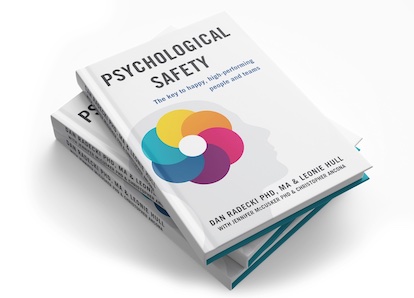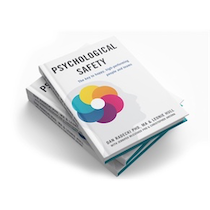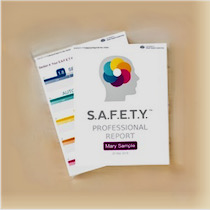In today’s corporate environment, psychological safety has ascended from mere buzzword status to become an essential part of healthy organizational culture. The shift stems from both internal motivations and external pressures, signaling a permanent place for psychological safety in modern workplaces.
This article offers executive coaches, trainers, and consultants a comprehensive overview of why psychological safety is essential for their client organizations and how it can be integrated and sustained through strategic initiatives and accreditation.
Internal Factors Driving the Need for Psychological Safety
Increased Performance
For professionals working with teams, it’s vital to understand that psychological safety directly impacts engagement and allows for greater innovation and productivity. When Google set out to determine what made their best performers tick, they discovered that psychological safety was the number one determining factor in team performance.
Through working with leaders and coaching them on developing greater skill in psychological safety, you’ll be helping them to create environments that encourage teams to share openly without the fear of repercussions. Teams will be more inclined to take risks and generate better solutions providing a competitive edge.
Improved Bottom Line
Psychological safety contributes to the financial health of a company by fostering better decision-making and reducing costs associated with workplace conflicts. In a recent case study, ABL was able to show how psychological safety led to a financial record-breaking year for one of our clients.
As a coach, consultant or trainer, emphasizing the economic benefits of psychological safety can help in persuading senior management to invest in relevant initiatives.
Occupational Health and Safety Compliance & Mitigating Risk
Addressing psychological hazards is now as crucial as managing physical ones. Executive coaches, consultants and trainers can guide organizations in complying with health and safety regulations, thereby mitigating risks associated with mental health that can have legal and financial repercussions.
Improved Retention
Retention is a significant concern for organizations. Employees are naturally inclined to stay longer where they feel genuinely valued and understood. Coaches, consultants and trainers can highlight how a psychologically safe environment encourages employees to stay longer, reducing turnover and the associated costs of hiring and training new staff.
Diversity, Inclusion, Equity & Belonging
An inclusive culture is underpinned by psychological safety. Coaches and consultants play a crucial role in fostering environments where diversity is celebrated, and all employees can thrive, thus enhancing corporate reputation and employee satisfaction.
External Factors Reinforcing the Urgency
ISO Psychosocial Risk Regulations
Global standards now mandate the management of psychosocial risks. Executive coaches, trainers and consultants need to be well-versed in psychological safety to guide their clients effectively in achieving compliance.
Workplace Legislation & Accountability
In regions like Australia, Canada, and the UK, where psychological safety practices are legally mandated, coaches and consultants must prepare their clients to adhere to these laws to avoid penalties.
Employee Expectations
Post ‘The Great Resignation’, employees prioritize workplaces that support their well-being. Coaches and consultants should advise leadership on the strategic value of meeting these expectations to attract and retain top talent.
Employee Health
With the rise of mental health issues, workplaces have a critical role in fostering employee well-being. Consultants, coaches and trainers can offer programs that help companies address these challenges, enhancing their role as supportive employers.
Achieving Psychological Safety Accreditation with ABL
To adapt and align with these driving forces, gaining accreditation in psychological safety is a strategic move for coaches, trainers and consultants. As the corporate world increasingly prioritizes mental health and well-being, those accredited in psychological safety will find themselves in high demand.
The Academy of Brain-based Leadership (ABL) offers a comprehensive Psychological S.A.F.E.T.Y.™ Accreditation. Using our neuroscience-backed S.A.F.E.T.Y.™ Assessment and Toolkit, coaches, consultants and trainers learn how to help people gain insight into their psychological safety needs and strategies to enhance the psychological safety of those they work with.
Conclusion
As an executive coach, trainer, or consultant, emphasizing the importance of psychological safety within client organizations is crucial. Not only does it foster a more innovative, productive, and inclusive workplace, but it also aligns with global standards and legal requirements.
Through applying the knowledge gained from accreditation in your consulting or coaching practices you’ll be significantly enhancing your value proposition to clients.
Psychological safety is essential and it’s here to stay. Don’t get left behind.
Next Steps
 Psychological S.A.F.E.T.Y. Accreditation
Psychological S.A.F.E.T.Y. Accreditation
 Take the S.A.F.E.T.Y.™ Self-Assessment
Take the S.A.F.E.T.Y.™ Self-Assessment
 Brain-based Leadership Certificate
Brain-based Leadership Certificate
 Contact us to discuss your needs
Contact us to discuss your needs

















